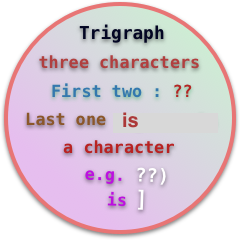A trigraph in C is formed of three characters, the first two characters are interrogation marks ??, and the last character is just a regular character.
ISO 646, standardized ASCII, and made national variants of it. The national variants differed from ASCII, in the way they represented 10 characters, including the 9 characters, that the C standard provided an alternative way of input for, by using trigraphs .
So, on a keyboard that does not have these 9 characters, or have other characters defined at their places, trigraphs can be used as a way for inputing these characters.
There are nine trigraphs in C , and they are:
| Trigraph sequence | Character |
|---|---|
??< | { |
??> | } |
??( | [ |
??) | ] |
??! | | |
??/ | \ |
??' | ^ |
??- | ~ |
??= | # |
Trigraphs can be used anywhere in a C source file, so they can be used in strings, and characters literals, and they can also be used in the C source code. Trigraph replacement is done early on in the compilation process, so it is done before preprocessing.
/*
trigraph.c
a Trigraph is simply formed of two interrogation marks
followed by a letter . They are :
??< {
??> }
??( [
??) ]
??! |
??/ \
??' ^
??- ~
??= #
*/
??=include <stdio.h>
int main( int argc, char * argv[ ] )
??<
int anIntArray??(3??) = ??< 2 , 3 , 5 ??>;
printf("anIntArray[0] is : %d ??/n", anIntArray[0]);
return 0;
??>
/* Output:
anIntArray[0] is : 2 .*/
gcc can be used to compile a C source file, that contains trigraphs, by using this command:
gcc trigraph.c -trigraphs -Wno-trigraphs
What follows is another example of using trigraphs, and how to escape a trigraph.
#include <stdio.h>
int main( int argc, char * argv[ ] )
{
char *cpDoubleQuote = "??/"";
/* ??\ will be replaced by \ ,
so you end up with \",
which is " .*/
printf( "*cpDoubleQuote is %s\n", cpDoubleQuote );
// *cpDoubleQuote is "
char *cpT = "??/??/t";
/* ??\ will be replaced by \
??\ will be replaced by \
We end up with \\t, so
\\ is \, so we end up
with \t .*/
printf( "*cpT is %s\n" , cpT );
// *cpT is \t
printf("%s", "\??(\n");
/* Placing a backslash before,
the first interrogation mark,
does not escape the trigraph.
Output:
[
*/
printf( "%s", "?\?(\n" );
/* Placing a backslash after
the second interrogation
mark, escapes the trigraph.
Output:
??(
*/
return 0; }

